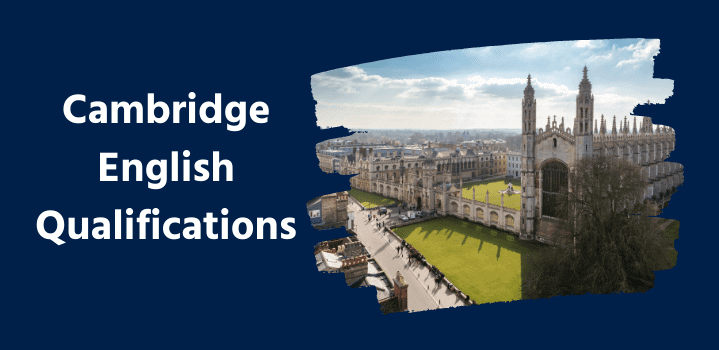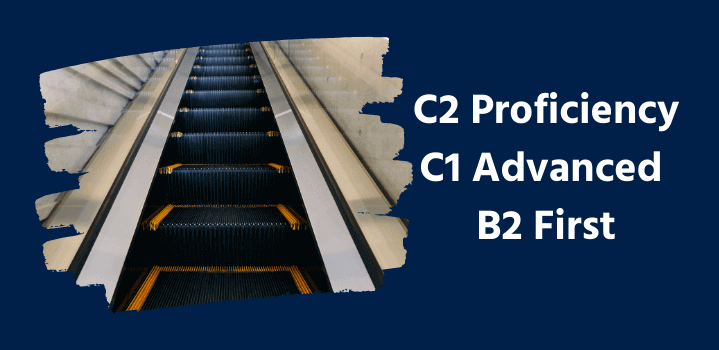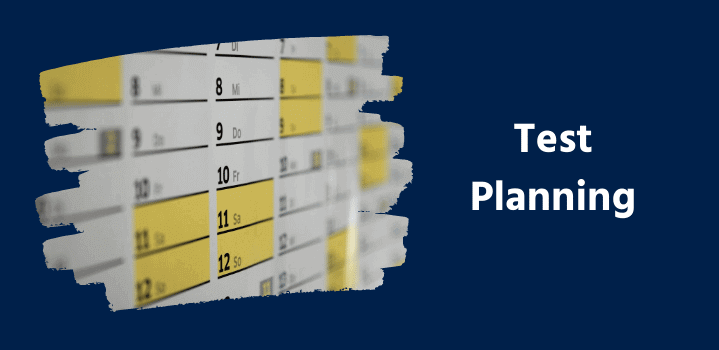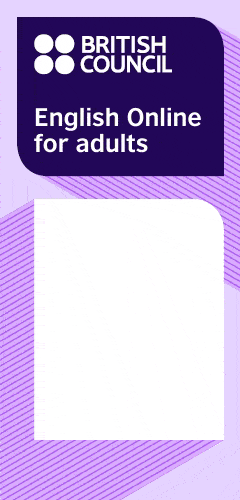The Cambridge English Qualifications is a globally recognised examination system for learners of English as a foreign or second language. It was initially developed by the University of Cambridge Local Examinations Syndicate (UCLES) and taken over by Cambridge Assessment, an independent examination board.
The exams have been designed for various levels and age ranges. As a result, students can take them at different points in their learning journey: from Level A1 Beginner to Level C2 Advanced. All the exams are mapped on a scale of 80 to 230.
History of Cambridge Certificate in English
Cambridge English Exams is part of Cambridge Assessment, an exam board and a non-teaching department at the Unversity of Cambridge. They created the Cambridge assessments as a way to measure proficiency in English as a second language.
Their first exam was the C2 Proficiency in launched 1913, followed by the B2 First in 1939. The Cambridge Assessment exams now run from A2 through to C2.
The Common European Framework (CEFR) adopted the scale going from A to C to measure language proficiency. In fact, Cambridge Assessment was involved in the creation of the CEFR and helped develop the guidelines.
Cambridge English Qualification levels
It’s essential you know what exam you need to take based on your current level of proficiency and the course you are looking to enrol on.
For example, the C1 certificate equates to the higher end of Band 6 on the IELTS scale.
Cambridge Assessment has an excellent table showing how the certificate levels map to IELTS scores.
A unique feature of the Cambridge English Qualifications, that no other SELT (Secure English Language test) exam has, is they are valid for life. All other SELT exams usually expire after two years.
This means if you are applying for an online degree or Master’s but have a C1 or C2 certificate from 5 years ago, most UK universities will still accept it as proof of English.
For university applications, the B2, C1 and C2 certificates are the most commonly accepted. The preparation required for each of these exams is broadly similar as they have very similar structures. We will look at these three certificates in more detail below.
The Cambridge English Scale
In 2015 the Cambridge English Scale was introduced to give a clear indicator of a student’s level. Initially, the certificates just showed a pass.
The Cambridge English Scale goes from 80 to 230. So, for example, an IELTS score of 5.5 equals a Score of 162, whereas an IELTS of 6.5 equals 176.
This scale means that a student holding a B2 certificate with a high score can join courses that require IELTS 6.5.
B2 First Certificate explained
B2 First is an exam that people can take for work or higher education. It’s one of the most popular Cambridge English Qualifications. Previously it was called the Cambridge English: First (FCE).
The exam takes 3.5 hours and has four exam papers. The Cambridge English Scale for the certificate is 160 to 179. These scores equal IELTS 5.5 up to 6.5.
These certificates are mainly used for foundation and pathway courses in preparation for a Degree or Master’s. Once you have completed the course, it shows you can effectively communicate and study at this level.
You will be able to,
Present arguments and opinions in English
Follow the news on TV
Write clearly about different points of view and express opinions
C1 Advanced Certificate explained
Preparing for and passing the C1 Advanced helps learners develop the skills to make studying at an English-speaking university an incredible experience. Previously it was called The Cambridge English: Advanced (CAE)
The exam takes around 4 hours and is made up of 4 exam papers. The Cambridge English Scale for the certificate is 180 to 199. This equals IELTS 6.5 up to 8.0.
The certificates are primarily used for entry to Degree and Master’s level courses.
They demonstrate that an individual can:
Follow university-level courses
Communicate confidently in academic tutorials and workplace meetings
Demonstrate a high level of fluency
C2 Proficiency Certificate explained
The C2 proficiency is the highest English language qualification available from the Cambridge English assessment. It demonstrates a complete understanding of the language and native-level fluency.
The test takes around 4 hours and is consists of 4 exam papers. The Cambridge scale for the certificate is from 200 to 230. Any score over 210 cannot be mapped to an IELTS band. The highest IELTS score is 9.0, which translates as 210 Cambridge English Scale.
This certificate shows a complete mastery of the language. Preparing for this and passing is most commonly used for access to postgraduate and PhD level study and senior professional appointments.
Students who take this course demonstrate that they can
Study at PhD level
Understand and produce complex writing
Confidently articulate sensitive issues and difficult field questions
Cambridge English Qualification test format
Each exam has four papers or sections. Each paper is designed to test one of the four components of the English language- reading, writing, listening and speaking. Each certificate has a slightly different number of parts and questions within each paper. However, the exams share a similar structure and revision strategies is the same for all of them.
Cambridge Exams Reading Paper
The reading section takes up to one and a half hours and has 7 or 8 parts with 52 to 56 questions,
The texts used can be from Books (fiction and non-fiction), non-specialist articles from newspapers, magazines and the internet. The B2 exam has around 2200 words to read in total, with the C1 and C2 certificates having roughly 3,000 words to read.
The reading part of the test makes up 40% of the marks. The question types on this paper are as follows,
Multiple choice- fill in the gaps
Choose the correct word from a list.
Open- fill in the gaps
Fill in the gaps from your own vocabulary.
Word formation
Change a word given to you so that it completes a gap in the text.
Keyword transformations
Complete a sentence with a keyword so that the meaning is the same as an example sentence.
Multiple-choice
answer multiple-choice questions about the text.
Cross-text multiple matching
Match a prompt to a text.
Gapped text
Choose the correct sentence to complete the gaps in the text.
Multiple matching
Match a statement with the correct short text.
Cambridge Exams Writing Paper
The writing exam has two parts and lasts one and a half hours.
In Part 1, you have to answer a compulsory question. You have to write between 140 to 190 words for the B2 certificate, increasing to 240 to 280 words for the C2 exam.
In part 2, you are given a situational-based writing task. For example, it could be an email or report you are given the context for. You must write from 140 to 260 words.
The C2 exam is slightly different from the other two and involves writing about set texts. However, it still has two sections, one compulsory and the second with a choice of questions.
Cambridge Exams Listening Paper
The listening exam takes 40 minutes with 30 questions. During this part of the test, you will listen to several types of recordings. These can range from conversations to monologues and radio broadcasts.
The exam focuses on 3 question types.
Multiple choice
You must select the correct answer, A, B, C or D, based on the recording you hear.
Sentence completion
You must complete the gaps in a set of sentences from the recording with up to three words.
Multiple matching
You must choose up to 5 correct options from a list of 8.
Cambridge Exams Speaking Paper
The speaking assessment for the Cambridge English qualification is different from most other English proficiency exams.
In the speaking paper, you interact not only with the examiner but also with another candidate. In all the other main Secure English language tests, you only speak with the examiner.
The speaking test paper takes around 15 minutes and is made up of 4 parts in the B2 and C1 exams.
Part 1 Interview
In this section, the examiner will ask you questions about yourself. This section takes around 2 minutes.
Part 2 Long turn
In this task, you are given images or photographs that you must talk about. Once you have spoken uninterrupted, the other candidate will comment on what you have said about your picture.
Part 3 Collaborative task
In this section, you are given some information and instructions on what you must do. Then, you speak with the other candidate to come to a decision based on the information you have. You have around three minutes to complete this task.
Part 4 Discussion
In this last part of the exam, the examiner will start a discussion by asking questions about the collaborative task. This final task lasts around 4 minutes.
In the C2 exam, the format is slightly different where the long run and discussion are combined.
When and how to take the test
The Cambridge xams take place at centres around the world on specific dates during the year. So you’ll need to check with your nearest office to find out about availability that works for you.
The Cambridge English website has a search tool to find your nearest centre.
Most candidates who take the test complete a English exam preparation course either online or at a local language school. However, you can use some of the free resources listed below to understand your current level to understand your options better.
How to practice for free
The Cambridge English exams are advanced certificates that require a high level of English language skills. Whichever of the tests you are taking, the preparation is broadly the same.
You can use the site links below to test your level and ability. The key to success in these exams is understanding the test structure and format. Weaker candidates can secure a pass by understanding the way the exam works. Conversely, students with excellent English can fail by misunderstanding the tasks involve in the exam.
Free Cambridge English resources and support materials
Free online Cambridge English test
University offers
You don’t need to wait until you have completed one of the above tests before applying to your chosen university and course. Most UK universities will issue a conditional offer if you apply without proof of English language level.
The benefit to you as an applicant of applying before you take the test is that you know that you will be guaranteed a place on the course once you have completed the test. In addition, you will know the minimum score you require.




